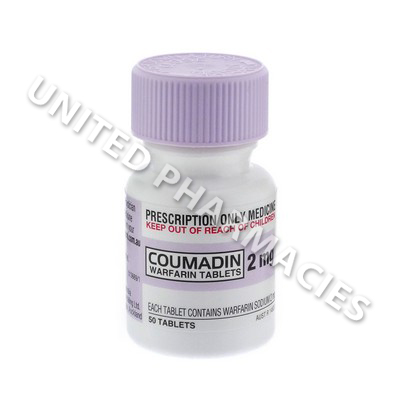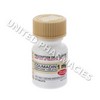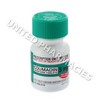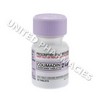Customers also like
Coumadin (Warfarin Sodium) - 1mg (50 Tablets)
from only £9.41
Coumadin (Warfarin Sodium) - 5mg (50 Tablets)
from only £3.39
Plavix 75 (Clopidogrel Bisulfate) - 75mg (14 Tablets)
from only £11.99
Xarelto (Rivaroxaban) - 15mg (28 Tablets)
from only £63.83
Pletoz (Cilostazol) - 50mg (10 Tablets)
from only £4.72
Description
| Main Use | Active Ingredient | Marketed Name |
| Preventing blood clots | Warfarin Sodium | Coumadin |
Uses
Coumadin (Warfarin Sodium) is known as a blood thinner or anticoagulant. It works by blocking the action of vitamin K epoxide reductase so as to prevent blood clots. Indications for this medicine include the prevention or treatment of pulmonary embolism and deep vein thrombosis. It may also be used to prevent blood clots in patients considered to be at risk of this, such as those affected by atrial fibrillation or patients who have had an artificial heart valve inserted.
Your body produces special proteins known as clotting factors. These help the blood clot so as to stop bleeding after you have suffered from a cut or other injury. However, a serious risk to the health is posed if these blood clots form inside the veins, as this could potentially prevent the blood from reaching the organs.
Medical conditions can make this more likely to occur. This medicine works by disrupting the process in which clotting factors are synthesized, which is achieved by blocking a certain component of vitamin K (known as the C1 subunit). As a direct result of this, the regeneration process of vitamin K1 epoxide, (a vital component in the clotting process) is significantly decreased. This helps to prevent blood clots.
Dosage and Administration
Coumadin (Warfarin Sodium) tablets come as a 2mg strength formula. Generally speaking, it may begin to take effect within the first 24 hours of administration, but the maximum anticoagulant effects don't normally occur until after 72 to 96 hours. Blood samples will be ordered by your doctor so that your doctor can determine its effectiveness. Adjustments to the dosage may also be ordered by the doctor.
The dosage regimen that doctors order patients taking it for thromboembolic stroke to administer usually ranges from 2mg to 5mg per day (for the first 1 to 2 days). After this, the dosage will be adjusted by the doctor based on blood test results. Patients should note that the exact amount required will be different for each individual and it is essential that the instructions of the doctor are strictly followed at all times.
Side effects
Side effects reported by patients undergoing treatment with the anticoagulant medicine Coumadin (Warfarin Sodium) include:
- Itchy skin
- Sensitivity to the cold
- Slight stomach discomfort
- Soreness affecting the joints
- Changes in the ability to taste
You will need to inform your doctor of any side effects which are experienced during treatment. Certain reactions may be dangerous and put your health at risk. You will need to consult a doctor straight away if you notice a weak feeling affecting the muscles, concentration difficulties, severe fatigue or any other serious side effects that have not been listed here.
Precautions
While you are being treated with this medicine, it is very important to note that it can make it easier to bleed. This bleeding may be severe. Therefore, it is essential to avoid partaking in any sports or other activities that put you at risk of cuts or bleeding.
If you experience bleeding, medical help is needed. Also, patients should note that there is a slight risk of necrosis associated with this medicine. Ensure that you ask your doctor about this before beginning treatment.
Seek immediate emergency medical attention if you suffer an allergic reaction. Symptoms to watch for, which may be indicative of a reaction, include skin rashes, hives, swelling of the face or limbs, trouble breathing, and trouble swallowing.
Always use Coumadin (Warfarin Sodium) as you have been prescribed by your doctor. Never self-medicate or change your dosage without first consulting your doctor. The correct dosage can vary depending on your health, medical history, and the severity of the condition being treated.
This medication may not be safe for all patients. Before you begin using it always disclose the following to your doctor:
- If you are pregnant or breastfeeding.
- If you suffer from any allergies.
- If you suffer from any other health conditions or illnesses.
- If you are using any other medicine (including all non-prescription).
- If you are using any supplements, vitamins, or herbal products of any kind.





-14Tabs-75mg-UK-1s.jpg)
-Tab-15mg-UK-1s.jpg)
-Tab-50mg-UK-1s.jpg)



